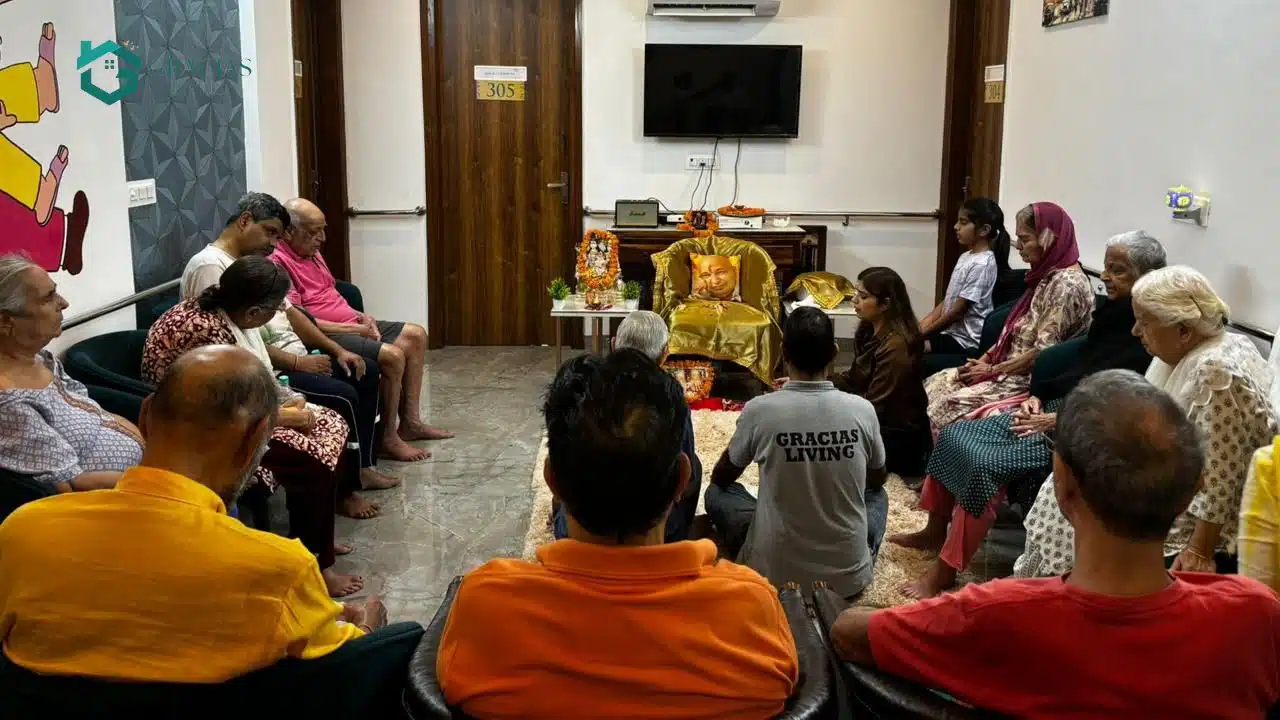
Best Dementia Care Home
Finding the best Dementia Care Home for a loved one with dementia is important. Families often worry about their safety, comfort, and how well they will be cared for.
While Gurgaon has many options, choosing the right dementia care home means finding a place that truly understands their needs.
At Gracias Living, we provide care that feels like home. With kindness, experience, and attention to every detail, we create a safe and comfortable space for our residents. We aim to bring peace of mind to families and a happy, fulfilling life to those in our care.

Choose the Right Dementia Care Home
- Visit the Home: Check if it’s clean, safe, and comfortable for residents.
- Talk to Staff: Ask about their training and how they care for people with dementia.
- Look for Personal Care: See if they provide care and activities based on individual needs.
- Check Health Support: Ensure they manage health, medication, and meals well.
- Read Reviews: Ask other families about their experience with the care home.
- Family Involvement: Pick a place that keeps you informed and welcomes visits.
Choose a home that feels safe, caring, and supportive for your loved one.
Dementia Care Resources
Explore our collection of in-depth articles on dementia, offering guidance, support, and expert advice for those navigating this challenging journey.

1. Dementia Care
Fundamentals of dementia care, offering insights into symptoms, diagnosis, and essential caregiving practices for managing dementia in its various stages.

2. Alzheimer’s Care
Alzheimer’s is a disease that affects the brain, Alzheimer’s care for caregivers and families, with practical advice and practices.

3. Vascular Dementia
Comparison of Vascular Dementia and Alzheimer’s Disease, emphasizing the key differences in their causes, symptoms, and care strategies.

4. Frontotemporal Dementia
Explores Frontotemporal Dementia, its unique symptoms, progression, and the challenges it presents for patients

5. Lewy Body Dementia
Lewy Body Dementia, its symptoms, and the specific care considerations for patients diagnosed with this condition in India.

6. Aggressive Dementia Patient
Manage aggression in dementia patients, including calming techniques and effective communication methods.

7. Activities for Dementia Patients
Therapeutic activities designed to engage and stimulate dementia patients, enhancing their quality of life.

8. Dementia Care for Parents
Children providing dementia care to their aging parents, offering practical advice and emotional support strategies.
Frequently Asked Questions
Question 1: What is dementia?
Ans: Dementia is a condition that affects the brain, causing problems with memory, thinking, and daily activities. It’s not a single disease but a group of symptoms.
Question 2: Can dementia be cured?
Ans: There is no cure for dementia, but treatments can help manage symptoms and improve quality of life.
Question 3: What are the early signs of dementia?
Ans: Early signs include memory loss, difficulty finding the right words, confusion, and changes in mood or behavior.
Question 4: Is dementia the same as Alzheimer’s disease?
Ans: No, Alzheimer’s is the most common type of dementia, but there are other types, like vascular dementia and Lewy body dementia.
Question 5: Can dementia be cured?
Ans: There is no cure for dementia, but treatments can help manage symptoms and improve quality of life.
Question 6: Who is at risk of developing dementia?
Ans: Risk factors include age (65+), family history, high blood pressure, and lifestyle factors like smoking and lack of exercise.
Question 7: How is dementia diagnosed?
Ans: Dementia is diagnosed through medical history, cognitive tests, MRI and sometimes brain scans to rule out other conditions.
Question 8: How does dementia progress?
Ans: Dementia progresses in stages, from mild (forgetfulness) to severe (complete dependency on others for care).
Question 9: What support is available for dementia patients and caregivers?
Ans: Support includes Assisted Living, Memory Care, counseling, support groups, and professional care services tailored to the needs of both patients and caregivers.
Question 10: How can I communicate better with someone who has dementia?
Ans: Use simple language, be patient, maintain eye contact, and offer reassurance. Avoid correcting or arguing, and focus on emotions rather than facts.

